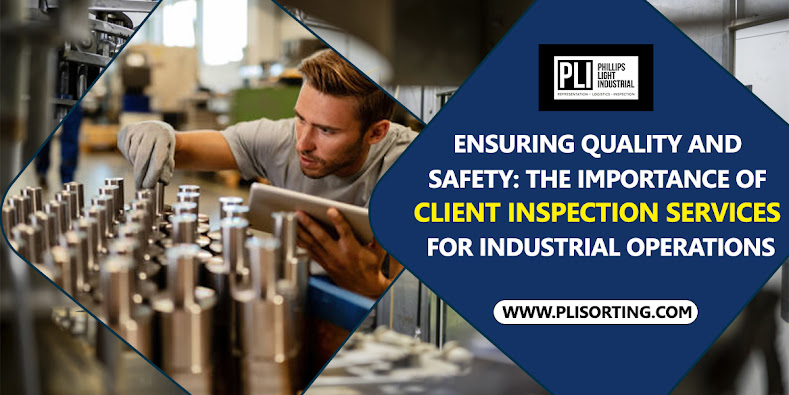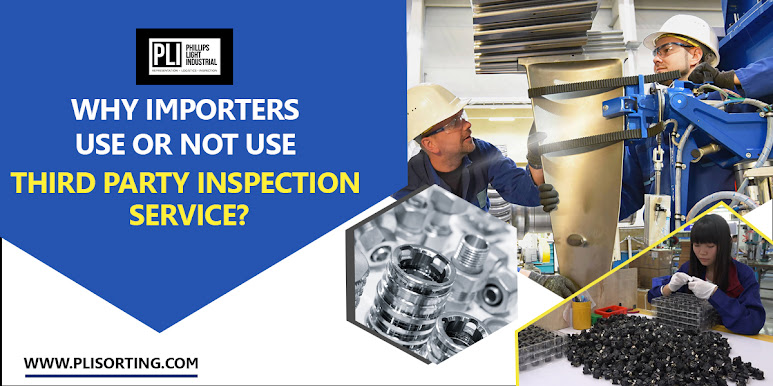What's the Difference Between Inspection and Quality Control?
In today's fast-paced manufacturing and production environments, ensuring product quality is paramount. Two key processes that play a crucial role in this are Inspection and Quality Control. While these terms might seem interchangeable, they have distinct differences that are essential to understand for optimizing operational efficiency and maintaining high-quality standards. In this comprehensive guide, we'll delve into the disparities between Inspection and Quality Control, shedding light on their unique roles, and explore the significance of third-party inspection services in ensuring superior quality outcomes. Stay tuned to uncover the nuances and make informed decisions for your business.
Inspection:
Inspection, as the name suggests, involves a thorough examination of products or materials to detect any defects or deviations from specified requirements. It's essentially a snapshot assessment conducted at various stages of production or upon completion. The primary objective of inspection is to identify and rectify any issues before the product reaches the end-user.
Types of Inspection:
Receiving Inspection: This occurs upon receipt of raw materials or components to ensure they meet quality standards.
In-Process Inspection: Carried out during various stages of manufacturing to monitor quality and address any deviations promptly.
Final Inspection: Conducted before the product is dispatched to ensure it meets customer expectations and regulatory requirements.
Quality Control: A Continuous Endeavor
On the other hand, quality control is a more comprehensive and ongoing process aimed at ensuring that the entire production process consistently meets specified standards. Unlike inspection, which focuses on identifying defects after they occur, quality control involves implementing measures to prevent defects from arising in the first place.
Key Components of Quality Control:
Process Optimization: Streamlining production processes to minimize variability and enhance efficiency.
Training and Education: Ensuring that personnel are adequately trained to maintain quality standards and identify potential issues.
Continuous Improvement: Implementing feedback mechanisms and making iterative improvements to enhance product quality over time.
The Role of Third-Party Inspection Services
While many companies have internal quality control measures in place, third-party inspection services offer an additional layer of assurance. These independent entities specialize in conducting impartial assessments of products and processes, providing unbiased feedback to manufacturers and consumers alike.
Benefits of Third-Party Inspection:
Objectivity: Third-party inspectors offer an unbiased perspective, free from internal biases or conflicts of interest.
Expertise: With specialized knowledge and experience, third-party inspectors can identify potential issues that may go unnoticed internally.
Compliance Assurance: By ensuring adherence to industry standards and regulations, third-party inspection services help mitigate legal and regulatory risks.
Why Choose Us
When it comes to ensuring the quality of your products, Plisorting.com stands out as a trusted partner. Here's why you should choose us:
Expertise: With 15 years of experience in the industry, we possess the expertise to conduct comprehensive inspections and implement effective quality control measures.
Unbiased Assessment: As a third-party inspection service, we offer impartial evaluations, providing you with transparent insights into your product's quality.
Customized Solutions: We understand that every business is unique, which is why we tailor our services to meet your specific needs and requirements.
Timely Delivery: We prioritize efficiency and ensure timely delivery of inspection reports, enabling you to make informed decisions without delay.
FAQs
Q : How does third-party inspection differ from in-house quality control?
A : Third-party inspection involves outsourcing evaluation tasks to independent agencies, ensuring impartiality and expertise, whereas in-house quality control refers to internal processes managed by the organization itself.
Q : What industries can benefit from third-party inspection services?
A : Third-party inspection services are invaluable across various sectors, including manufacturing, construction, oil and gas, automotive, aerospace, and consumer goods.
Q : Are third-party inspection services cost-effective in the long run?
A : While there may be initial investment costs, third-party inspection services offer significant long-term benefits by reducing rework, minimizing defects, and enhancing overall product quality.
Q : How can businesses choose the right third-party inspection service provider?
A : It's essential to consider factors such as reputation, experience, certifications, and industry expertise when selecting a third-party inspection service provider.
Q : What role does regulatory compliance play in third-party inspections?
A : Third-party inspectors ensure compliance with relevant regulations, standards, and quality management systems, helping businesses mitigate risks and avoid regulatory penalties.
Q : Can third-party inspection services help improve supply chain efficiency?
A : Yes, by conducting thorough inspections at various stages of the supply chain, third-party providers help identify bottlenecks, optimize processes, and enhance overall supply chain efficiency.
Conclusion
Understanding the disparity between Inspection and is pivotal for organizations striving to uphold impeccable quality standards. While Inspection focuses on identifying defects post-production, Quality Control encompasses holistic measures to ensure consistent quality throughout the manufacturing process. By leveraging third-party inspection services, businesses can augment their quality assurance efforts, mitigate risks, and gain a competitive edge in today's dynamic marketplace. Remember, when it comes to quality, precision, and reliability, choose plisorting.com for unparalleled expertise and excellence.
Reference URL :- What's the Difference Between Inspection and Quality Control?



Comments
Post a Comment